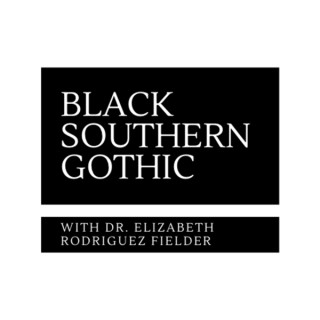Black Southern Gothic
Follow Black Southern GothicBlack Southern Gothic is a podcast connected to a course at University of Iowa where we explore African American writing from the US South. These episodes will introduce you to readings from Zora Neale Hurston, Jesmyn Ward, Randall Kenan, Natasha Tretheway, Tayari Jones, and Attica Locke.
- Oct 5, 2020 LATEST EPISODE
- infrequent NEW EPISODES
- 14m AVG DURATION
- 6 EPISODES
Latest episodes from Black Southern Gothic

In this episode, I interview University of Iowa PhD candidate Enrico Bruno about his work on Randall Kenan. We discuss the role of mythology in 20th century African American fiction and how the legend of flight appears in Kenan's first novel, A Visitation of Spirits. We then turn to a discussion of Let the Dead Bury Their Dead and ways in which Kenan uses the gothic trope to explore the intersections of race and sexuality in small-town South. We conclude with a bigger question of why the gothic is perhaps America's literary genre of choice and how it relates to the country's political history.

In preparation for reading Jesmyn Ward’s Sing, Unburied, Sing, we explore the history and musical legacy of one of the most notorious prisons in the United States, the Mississippi State Penitentiary, otherwise known as Parchman Farm.

Discussing Zora Neale Hurston’s “The Gilded Six Bits” and William Faulkner’s “That Evening Sun” and “Pantaloon in Black” and looking at the evidence that Faulkner borrowed Hurston’s ideas and writing for his gothic fiction about Black life in Mississippi.

In today’s episode, we discuss the life and work of Zora Neale Hurston, with a focus on her as an anthropologist of black culture in the US South. I ask focus questions for this week's readings from Mules and Men and Tell My Horse. Here are links to the Library of Congress recordings featured in this episode: "Crow Dance" (vocals with clapping) performed by Zora Neale Hurston at Federal Music Project Office, Jacksonville, Florida, on June 18, 1939. https://www.loc.gov/item/flwpa000017/ "Halimuhfack" (vocals) performed by Zora Neale Hurston at Federal Music Project Office, Jacksonville, Florida, on June 18, 1939. https://www.loc.gov/item/flwpa000014/

In this short episode, I explain what I mean by the terms Black, Southern, and Gothic and ask the main questions of the course. I place this course in context of African American literature as well as the gothic literary tradition.








